Грег Иган - Permutation City
Здесь есть возможность читать онлайн «Грег Иган - Permutation City» весь текст электронной книги совершенно бесплатно (целиком полную версию без сокращений). В некоторых случаях можно слушать аудио, скачать через торрент в формате fb2 и присутствует краткое содержание. Жанр: Фантастика и фэнтези, Киберпанк, на английском языке. Описание произведения, (предисловие) а так же отзывы посетителей доступны на портале библиотеки ЛибКат.
- Название:Permutation City
- Автор:
- Жанр:
- Год:неизвестен
- ISBN:нет данных
- Рейтинг книги:4 / 5. Голосов: 1
-
Избранное:Добавить в избранное
- Отзывы:
-
Ваша оценка:
- 80
- 1
- 2
- 3
- 4
- 5
Permutation City: краткое содержание, описание и аннотация
Предлагаем к чтению аннотацию, описание, краткое содержание или предисловие (зависит от того, что написал сам автор книги «Permutation City»). Если вы не нашли необходимую информацию о книге — напишите в комментариях, мы постараемся отыскать её.
Permutation City — читать онлайн бесплатно полную книгу (весь текст) целиком
Ниже представлен текст книги, разбитый по страницам. Система сохранения места последней прочитанной страницы, позволяет с удобством читать онлайн бесплатно книгу «Permutation City», без необходимости каждый раз заново искать на чём Вы остановились. Поставьте закладку, и сможете в любой момент перейти на страницу, на которой закончили чтение.
Интервал:
Закладка:
Squeak. "Okay. Experiment one, trial number one. Time resolution five milliseconds. Are you ready?"
"Yes."
The djinn vanished. Paul counted: "One. Two. Three. Four. Five. Six. Seven. Eight. Nine. Ten."
Squeak. "Anything to report?"
"No. I mean, I can't help feeling slightly apprehensive, just knowing that you're screwing around with my . . . infrastructure. But apart from that, nothing."
Durham's eyes no longer glazed over while he was waiting for the speeded-up reply; either he'd gained a degree of self-discipline, or -- more likely -- he'd interposed some smart editing software to conceal his boredom.
Squeak. "Don't worry about apprehension. We're running a control, remember?"
Paul would have preferred not to have been reminded. He'd known that Durham must have cloned him, and would be feeding exactly the same sensorium to both Copies -- while only making changes in the model's time resolution for one of them. It was an essential part of the experiment -- but he didn't want to dwell on it. A third self, shadowing his thoughts, was too much to acknowledge on top of everything else.
Squeak. "Trial number two. Time resolution ten milliseconds."
Paul counted. The easiest thing in the world, he thought, when you're made of flesh, when you're made of matter, when the quarks and the electrons just do what comes naturally. Human beings were embodied, ultimately, in fields of fundamental particles -- incapable, surely, of being anything other than themselves. Copies were embodied in computer memories as vast sets of numbers. Numbers which certainly could be interpreted as describing a human body sitting in a room . . . but it was hard to see that meaning as intrinsic, as necessary, when tens of thousands of arbitrary choices had been made about the way in which the model had been coded. Is this my blood sugar here . . . or my testosterone level? Is this the firing rate of a motor neuron as I raise my right hand . . . or a signal coming in from my retina as I watch myself doing it? Anybody given access to the raw data, but unaware of the conventions, could spend a lifetime sifting through the numbers without deciphering what any of it meant.
And yet no Copy buried in the data itself -- ignorant of the details or not -- could have the slightest trouble making sense of it all in an instant.
Squeak. "Trial number three. Time resolution twenty milliseconds."
"One. Two. Three."
For time to pass for a Copy, the numbers which defined it had to change from moment to moment. Recomputed over and over again, a Copy was a sequence of snapshots, frames of a movie -- or frames of computer animation.
But . . . when, exactly, did these snapshots give rise to conscious thought? While they were being computed? Or in the brief interludes when they sat in the computer's memory, unchanging, doing nothing but representing one static instant of the Copy's life? When both stages were taking place a thousand times per subjective second, it hardly seemed to matter, but very soon --
Squeak. "Trial number four. Time resolution fifty milliseconds."
What am I? The data? The process that generates it? The relationships between the numbers?
All of the above?
"One hundred milliseconds."
"One. Two. Three."
Paul listened to his voice as he counted -- as if half expecting to begin to notice the encroachment of silence, to start perceiving the gaps in himself.
"Two hundred milliseconds."
A fifth of a second. "One. Two." Was he strobing in and out of existence now, at five subjective hertz? The crudest of celluloid movies had never flickered at this rate. "Three. Four." He waved his hand in front of his face; the motion looked perfectly smooth, perfectly normal. And of course it did; he wasn't watching from the outside. "Five. Six. Seven." A sudden, intense wave of nausea passed through him but he fought it down, and continued. "Eight. Nine. Ten."
The djinn reappeared and emitted a brief, solicitous squeak. "What's wrong? Do you want to stop for a while?"
"No, I'm fine." Paul glanced around the innocent, sun-dappled room, and laughed. How would Durham handle it if the control and the subject had just given two different replies? He tried to recall his plans for such a contingency, but couldn't remember them -- and didn't much care. It wasn't his problem any more.
Squeak. "Trial number seven. Time resolution five hundred milliseconds."
Paul counted -- and the truth was, he felt no different. A little uneasy, yes -- but factoring out any squeamishness, everything about his experience seemed to remain the same. And that made sense, at least in the long run -- because nothing was being omitted, in the long run. His model-of-a-brain was only being fully described at half-second (model time) intervals -- but each description still included the results of everything that "would have happened" in between. Every half-second, his brain was ending up in exactly the state it would have been in if nothing had been left out.
"One thousand milliseconds."
But . . . what was going on, in between? The equations controlling the model were far too complex to solve in a single step. In the process of calculating the solutions, vast arrays of partial results were being generated and discarded along the way. In a sense, these partial results implied -- even if they didn't directly represent -- events taking place within the gaps between successive complete descriptions. And when the whole model was arbitrary, who was to say that these implied events, buried a little more deeply in the torrent of data, were any "less real" than those which were directly described?
"Two thousand milliseconds."
"One. Two. Three. Four."
If he seemed to speak (and hear himself speak) every number, it was because the effects of having said "three" (and having heard himself say it) were implicit in the details of calculating how his brain evolved from the time when he'd just said "two" to the time when he'd just said "four."
"Five thousand milliseconds."
"One. Two. Three. Four. Five."
Besides, hearing words that he'd never "really" spoken wasn't much stranger than a Copy hearing anything at all. Even the standard millisecond clock rate of this world was far too coarse to resolve the full range of audible tones. Sound wasn't represented in the model by fluctuations in air pressure values -- which couldn't change fast enough -- but in terms of audio power spectra: profiles of intensity versus frequency. Twenty kilohertz was just a number here, a label; nothing could actually oscillate at that rate. Real ears analyzed pressure waves into components of various pitch; Paul knew that his brain was being fed the preexisting power spectrum values directly, plucked out of the nonexistent air by a crude patch in the model.
"Ten thousand milliseconds."
"One. Two. Three."
Ten seconds free-falling from frame to frame.
Fighting down vertigo, still counting steadily, Paul prodded the shallow cut he'd made in his forearm with the kitchen knife. It stung, convincingly. So where was this experience coming from? Once the ten seconds were up, his fully described brain would remember all of this . . . but that didn't account for what was happening now. Pain was more than the memory of pain. He struggled to imagine the tangle of billions of intermediate calculations, somehow "making sense" of themselves, bridging the gap.
And he wondered: What would happen if someone shut down the computer, just pulled the plug -- right now?
He didn't know what that meant, though. In any terms but his own, he didn't know when "right now" was.
Читать дальшеИнтервал:
Закладка:
Похожие книги на «Permutation City»
Представляем Вашему вниманию похожие книги на «Permutation City» списком для выбора. Мы отобрали схожую по названию и смыслу литературу в надежде предоставить читателям больше вариантов отыскать новые, интересные, ещё непрочитанные произведения.
Обсуждение, отзывы о книге «Permutation City» и просто собственные мнения читателей. Оставьте ваши комментарии, напишите, что Вы думаете о произведении, его смысле или главных героях. Укажите что конкретно понравилось, а что нет, и почему Вы так считаете.

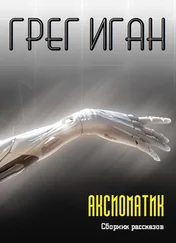
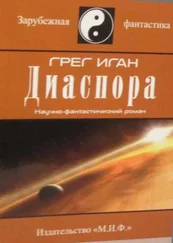

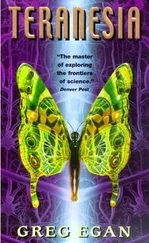
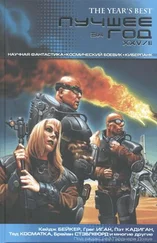

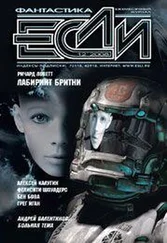
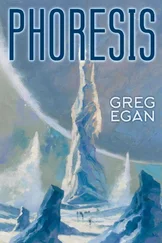
![Грег Иган - Рассказы [компиляция]](/books/419837/greg-igan-rasskazy-kompilyaciya-thumb.webp)
